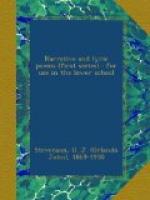[46] wampum. Beads made of shells, and used by the Indians both for money and for ornament.
[47] to chaffer for peltries. To trade in skins or furs.
[48] merestead. A bounded lot.
[49] brackish. saltish.
[50] The chief character in a German legend.
[51] Helvetia. Switzerland
[52] stall. A booth, or shop.
[53] distaff. The staff for holding the flax or wool from which the thread is spun.
[54] See Exodus xxviii, for the references in this description.
[55] laver. A brazen vessel in the court or a Jewish tabernacle, where the priests washed their hands and feet.
[56] Book of Ruth, chapter iv.
[57] rack. vapor.
[58] An English proverb.
[59] Eshcol. When Moses sent spies into the land of Canaan, “they came unto the brook of Eshcol, and cut down from thence a branch with one cluster of grapes, and they bare it between two upon a staff.”
[60] See Genesis, xxiv.
SOHRAB AND RUSTUM.
The story of Sohrab and Rustum is based on an episode related in the Shahnamah, or Book of Kings, by Firdusi, the epic poet of Persia. The chief hero of the Shahnamah is Rustum, the Hercules of Persian mythology. Rustum was the son of Zal, a renowned Persian warrior. When a mere child, he performed many wonderful deeds requiring great strength and valor. He became the champion of his people, restored the Persian king to his throne, and defeated Afrasiab, the great Turanian, or Tartar, leader, who had invaded Persia. During a hunting expedition in Turan, his renowned horse Ruksh was stolen from him, and in order to recover it, he was forced to call on the King of Samangam, a neighbouring city. The king welcomed him, and gave him his daughter Tahminah, in marriage. Before the birth of his child, however, Rustum was called back to Persia, but he left with Tahminah a charm, or amulet, by which he might be able to recognize his offspring. When Sohrab, the son, was born, the mother, fearing that Rustum would return and take him away from her to bring him up as a soldier, sent word that a daughter had been born to him. Rustum, accordingly, did not return to Samangam, but remained in ignorance of Sohrab. In the meantime, as Sohrab grew, up he became a great warrior, and having learned that the renowned Rustum was his father, he longed to meet him, that he might fight for him and help to make him king. At length the opportunity came. The army of Afrasiab, under the command of Peran-Wisa, invaded Persia once more, and Sohrab accompanied the host. The Persians prepared to meet the invaders, and the two armies met at the river Oxus, which formed the boundary between the two kingdoms. It is at this point that the story of Sohrab and Rustum begins.
[Sohrab wakes in the early morning, and passes through the sleeping army to the tent of old Peran-Wisa, his chief.]




